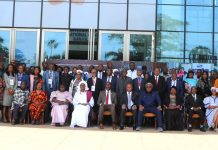The National Human Rights Commission (NHRC) has urged the government through the Judiciary to expand the automated transcription system to all courts to expedite proceedings.
The commission noted in its 2024 State of Human Rights report that the Judiciary of The Gambia has made significant gains in improving access to justice in The Gambia as it has already introduced the Court Automated System in 6 courts and has developed a Case Management System such as: e-filing, e-payment for filling processes, and e-assignment of cases.
It reported that the Judiciary is also developing two Special Criminal Courts at Mile 7 and at the former Judicial Training Institute, and a court on Sexual and Gender-Based Violence is being constructed under the leadership of the Ministry of Gender, Children and Social Welfare.
Referencing an Afrobarometer survey, published in April- May, 2024, which assessed people’s perception of access to justice in The Gambia. “The findings indicated an erosion of trust in the courts,” the NHRC stated.
The Commission further stated that, the said survey had found that fewer than half (44%) of citizens say they feel “somewhat confident” (28%) or “very confident” (16%) that ordinary people who are wronged can obtain justice in the courts. More than half (54%) express little or no such confidence.
“On the question of affordability of justice, 34% of the respondents were of the view that they could afford justice while about 72% of the respondents indicated they cannot, due to poverty, afford the services of a lawyer,” it added.
“Given the important role the justice system plays in The Gambia, it is crucial to maintain public confidence in the justice delivery mechanisms of The Gambia in line with the Judiciary of The Gambia’s Strategic Plan 2021- 2025,” the commission further stated.
“As indicated in previous State of Human Rights Reports and reported in Gambian newspapers, justice delivery continues to be affected by the slow disposition of cases in the Courts, high cost of legal fees, and limited court infrastructure in rural areas. This has resulted in a backlog of cases owing to delays in prosecution, adjudication and conclusion of cases,” it stated.
The commission recommends that:
1. The Judiciary of The Gambia to fast-track the implementation of their Strategic Plan, in particular Goal 4 ‘Improve efficiency of court processes and service delivery.’
2. The Judiciary to expand the automated transcription system to all courts in order to reduce the length of proceedings.
3. The Gambia Bar Association and other legal professional bodies to endeavour to provide pro bono (free) services to indigenes.
4. The Ministry of Justice to improve the human capacity of the National Agency for Legal Aid (NALA) to provide services to low earning members of society.





















